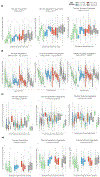Infant diet and maternal gestational weight gain predict early metabolic maturation of gut microbiomes
- PMID: 30374198
- PMCID: PMC6294307
- DOI: 10.1038/s41591-018-0216-2
Infant diet and maternal gestational weight gain predict early metabolic maturation of gut microbiomes
Abstract
Commensal gut bacterial communities (microbiomes) are predicted to influence human health and disease1,2. Neonatal gut microbiomes are colonized with maternal and environmental flora and mature toward a stable composition over 2-3 years3,4. To study pre- and postnatal determinants of infant microbiome development, we analyzed 402 fecal metagenomes from 60 infants aged 0-8 months, using longitudinal generalized linear mixed models (GLMMs). Distinct microbiome signatures correlated with breastfeeding, formula ingredients, and maternal gestational weight gain (GWG). Amino acid synthesis pathway accretion in breastfed microbiomes complemented normative breastmilk composition. Prebiotic oligosaccharides, designed to promote breastfed-like microflora5, predicted functional pathways distinct from breastfed infant microbiomes. Soy formula in six infants was positively associated with Lachnospiraceae and pathways suggesting a short-chain fatty acid (SCFA)-rich environment, including glycerol to 1-butanol fermentation, which is potentially dysbiotic. GWG correlated with altered carbohydrate degradation and enriched vitamin synthesis pathways. Maternal and postnatal antibiotics predicted microbiome alterations, while delivery route had no persistent effects. Domestic water source correlates suggest water may be an underappreciated determinant of microbiome acquisition. Clinically important microbial pathways with statistically significant dietary correlates included dysbiotic markers6,7, core enterotype features8, and synthesis pathways for enteroprotective9 and immunomodulatory10,11 metabolites, epigenetic mediators1, and developmentally critical vitamins12, warranting further investigation.
Conflict of interest statement
COMPETING FINANCIAL INTERESTS STATEMENT
The authors declare that they have no competing financial interests.
Figures




References
-
- Bäckhed F , et al. Dynamics and Stabilization of the Human Gut Microbiome during the First Year of Life. Cell Host Microbe 17, 852 (2015). - PubMed
-
- Oozeer R , et al. Intestinal microbiology in early life: specific prebiotics can have similar functionalities as human-milk oligosaccharides. Am J Clin Nutr 98, 561S-571S (2013). - PubMed
Methods-Only References
-
- Fein SB , et al. Infant Feeding Practices Study II: study methods. Pediatrics 122 Suppl 2, S28-35 (2008). - PubMed
Publication types
MeSH terms
Grants and funding
LinkOut - more resources
Full Text Sources
Medical

